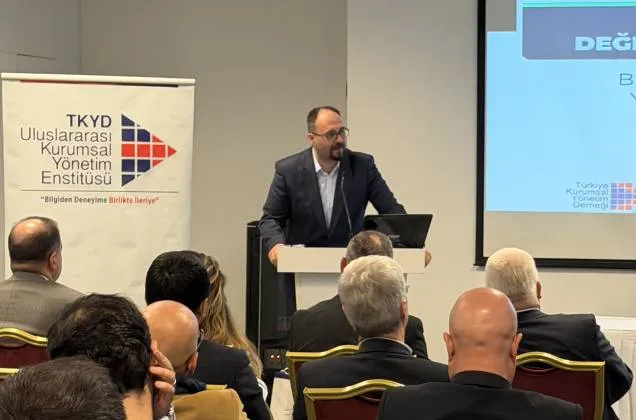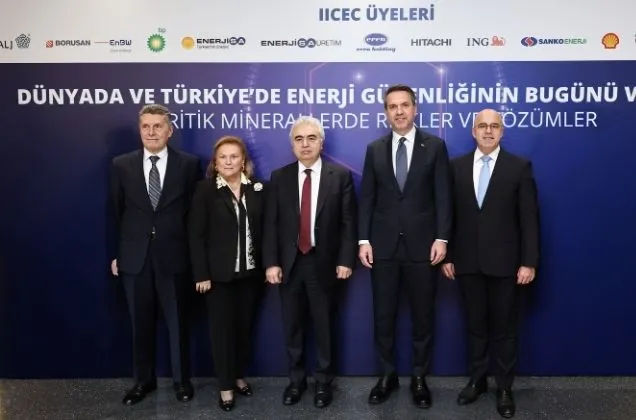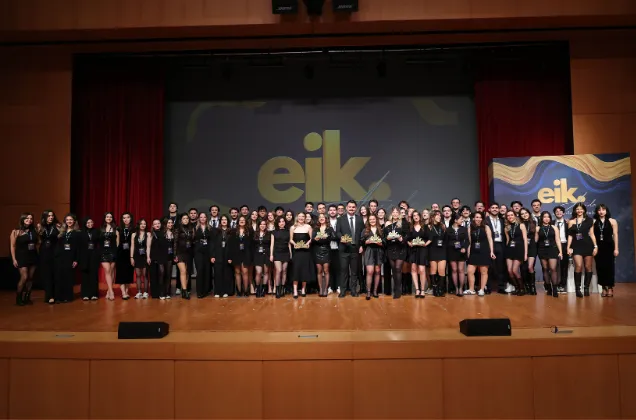08/05/2023
Sabancı University Istanbul International Center for Energy and Climate (IICEC) addressed growth and development opportunities in renewable energy evaluated from a broad sustainability perspective at the live-stream IICEC Webinar: “Opportunities in Renewable Energy for a Sustainable Future” on 3 May 2023.
After the opening speech of the Webinar delivered by IICEC Coordinator Dr. Mehmet Doğan Üçok; a distinguished panel was moderated by Elif Düşmez Tek, President of the Energy Digitalization Association (EDIDER) that hosted Enerjisa Üretim CEO İhsan Erbil Bayçöl, ING Group Managing Director and Global Lead for Renewables and Power Diederick Van Den Berg, Turkish Wind Energy Association (TÜREB) Chair İbrahim Erden, Geothermal Energy Association Chair Ali Kındap and TÜSİAD Deputy Secretary General Dr. Nurşen Numanoğlu as panelists.
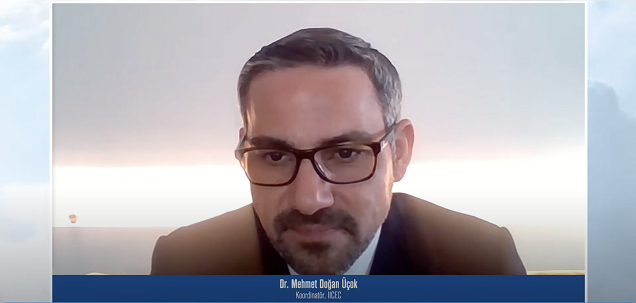
In the opening speech, IICEC Coordinator Dr. Mehmet Doğan Üçok stated that if the average temperature increase exceeds 1.5 degrees, all the balances in the world will change. He continued, “At the moment, important steps are being taken towards renewable energy. According to the figures of the International Energy Agency, nearly 60% of the power plants installed in the world last year consisted of solar power plants and close to 30% were wind power plants; so almost all of them were renewable energy plants. Despite these steps, it still seems very difficult to reduce emissions in the world by half by 2030”.
Dr. Üçok: “If the average temperature increase exceeds 1.5 degrees, all the balances in the world will change”
Making the opening speech of the panel, IICEC Coordinator Dr. Mehmet Doğan Üçok, drew attention to the current level reached in global warming, and said, “If the average temperature increase goes beyond 1.5 degrees, all the balances in the world will change. IPCC reports reveal that human-induced climate warming reached an unprecedented level between 1850 and 2000. However, it is a scientific fact that climate change brings along extreme climate events. In this context, the goal of limiting the global temperature increase to 1.5 degrees is an extremely critical threshold for climate security. Towards this goal, the International Energy Agency, in its 2050 net zero report, laid out a comprehensive roadmap for the global energy system to reach its net zero emissions target by 2050. To reduce emissions to net zero, renewable energy, energy efficiency, electrification, hydrogen and hydrogen-based fuels, bioenergy and carbon capture and storage were put forward as the main topics. According to the artificial intelligence-based modeling of Stanford University, the world will see 1.5 degrees of temperature increase in the 2030s. Despite all that has happened in terms of the climate crisis, good developments continue to happen in the world. According to the figures of the International Energy Agency, nearly 60% of the power plants installed in the world last year consisted of solar power plants and close to 30% were wind power plants; so almost all of them were renewable energy plants. Again, despite the current figures, it seems difficult to reduce emissions in the world by half in 2030”.
Elif Düşmez Tek: “The energy sector has been going through a major change, transformation and crisis in recent years”
President of the Energy Digitalization Association (EDIDER), Elif Düşmez Tek:
“As the energy sector, we have been going through an environment of major change, transformation and crisis in recent years. The first trigger of this transformation was climate change. While we were talking about the energy transition triggered by climate change, we were faced with the COVID pandemic. Meanwhile, we experienced a period of great uncertainty that emerged with supply and demand imbalances and then the problems in the supply chain. Afterwards, a major supply security crisis emerged, this time brought on by the Russia-Ukraine war, which affected Europe the most. In this process, we are witnessing the establishment of new balances, there are things we know, and there are things we do not know yet, and we are trying to predict them.
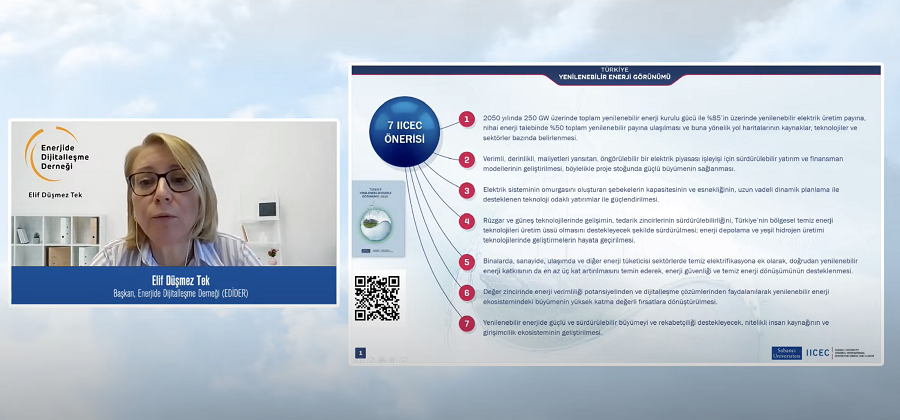
If we look at these events from the perspective of Turkey, on the one hand, there are risk factors, but on the other hand, we observe that new opportunities are emerging. It is extremely valuable to develop some analytical foresight to manage emerging risks in addition to better understanding and capturing opportunities. Turkey Energy Forecasts, prepared by IICEC, has recently become one of the pioneering studies in the field of Turkey's renewable energy outlook. This study presents 7 concrete recommendations to stakeholders, including human resource development, to utilize Turkey's high growth potential, which offers multidimensional opportunities for energy security, clean energy transformation, competitive and technology-oriented industrial development in renewable energy and related technologies”.
Enerjisa Üretim CEO İhsan Erbil Bayçöl: “There is a need for trained manpower and more female employees in the energy sector”
Enerjisa Üretim CEO İhsan Erbil Bayçöl:
“Last year, we did not know exactly what Turkey's goal for wind and solar in 2030 was. Both the national energy plan and the IICEC study have at least made some things concrete. But whatever your goal is, it is the people who will fulfill it. Therefore, the most basic need of Turkey and the world in renewable or zero carbon targets for 2030, 2040, and 2050 is human resources. At the moment, we can see the shortage of human resources and the resulting challenges both in Turkey and in other countries. We need trained manpower.
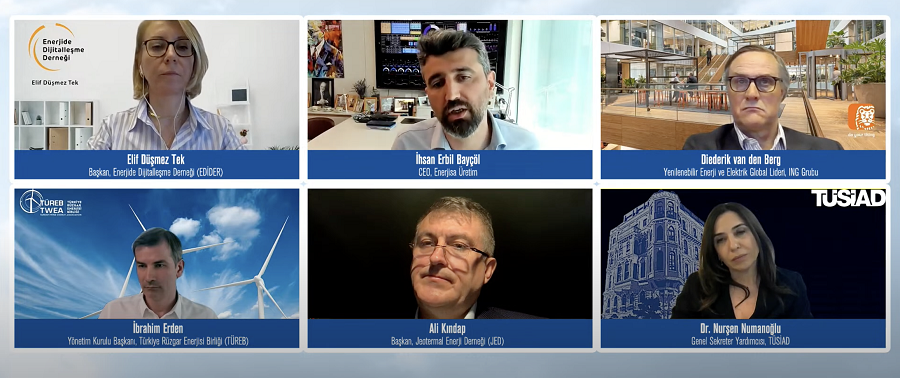
In addition, one of the biggest problems of the sector is the number of female employees. At Enerjisa, we have undertaken an investment of 1,000 megawatts. We want to implement it in the next 3 years. Our only dream on that journey is not to bring another 1,000-megawatt power plant into operation, but to have at least a few of our power plants' managers being women, engineers being women, technicians being women when these power plants go into operation, and being able to see that all the staff are women when you enter a power plant”.
Diederick Van Den Berg: “As the world, we need to accept that we are at the very beginning of the energy transition”
ING Group Renewable Energy and Electricity Global Leader Diederick Van Den Berg:
“As an international bank, we are present in more than 40 countries and we talk to many parties through this network. We get a lot of intelligence on markets and developments, especially in the context of renewable energy. For the first time, I've seen some industry leaders talk about strong economic headwinds and some activity starting to slow down. Globally, some data is shared by big data providers. There seems to be a clear slowdown, especially in China and India.
Although investments in clean energy may be a little less advantageous than in the past, for example, large wind turbine manufacturers have been losing for a year or two. Uncertainties can cause slowdowns in investments, delays, and even complete cancellation of investment decisions. Especially in many countries, the waiting times and permits for projects are getting longer. We also see some cuts in renewable energy. Of course, this changes from market to market. But all this does not present a good picture for us in terms of renewable energy. I am optimistic and supportive of clean energy. This is very real and there are demands from the financial circles to speed up this process. Realizing the ambitious targets currently set by governments may take a little longer than we anticipate. As the world, we also need to acknowledge that we are at the very beginning of this clean energy transition. In this market, investors, banks, and people do not have the desire to build 10-20 megawatt projects. It takes too long, it costs a lot, so they focus more on developing portfolios”.
İbrahim Erden: “As Turkey, we are a country that can provide more than 50% of wind turbines locally”
Turkish Wind Energy Association (TÜREB) Board of Directors Chair İbrahim Erden:
“In Turkey, the weight of local providers in wind power has increased in the last 15 years. This has happened not only in wind, but also in hydropower, partially in geothermal. Perhaps the last 60-70 years of this country's 100-year history witnessed considerable industrialization moves. In the last 15 years, we have seen the reflections of this on renewable energy. Here, we are in a situation where we can provide more than 50% of wind turbines locally and target 65% in renewable energy turbines. If this is a gain, it is important to transform this gain into a stronger future. From now on, we have a chance to become a real supplier partner, beyond the discourse that we are the natural gas supplier partner transit route for both Europe and America in a world that is becoming more and more global.
The supply chain centralized in the Far East will spread to the periphery of the European Union. We are one of the countries with the most remarkable industrial infrastructure here. We must make a profit by using our industrialized infrastructure both for our own needs and by putting it into the service of Europe and its allies. Today, our wind industry has an annual export volume of 1.5 billion dollars. This is an important achievement. We export to more than 50 countries. Therefore, we have to unleash our potential in this transformation. I predict that the capacities to be provided for at least 20,000 megawatts of wind and 10 thousand megawatts of solar will create an opportunity by 2030 to both meet the need for green transformation and put us ahead of the competition in Europe".
Ali Kındap: “Turkey's geothermal potential is way above our expectations”
Chair of the Board of the Geothermal Energy Association Ali Kındap:
“We are an entrepreneur group that believes in the potential and power of our country. When we think about the world's energy transformation goals and Turkey's transformation goals, these potentials, both wind, solar and geothermal, are really valuable. Compared to others, geothermal is one of the resources that has not made its potential fully visible. Even before we started talking wind and sun, geothermal was in our lives. We can see that in the Republican period, these resources were used intensively for both heating, health and spa purposes.
With the efforts and investments during the YEKDEM (Electricity Market Renewable Energy Resources Support Mechanism) period, we have seen that we are far above this potential. For now, we have reached an installed power of 1,700 megawatts. With this installed power, we rank 1st in Europe and 4th in the world. Geothermal is not only at the forefront with its installed power in the field of electricity, but also with its direct use of 5,020 megawatts in some investments. We currently have most of this direct use for urban heating, greenhouse heating, tourism and thermal purposes. We have the ability to work like a thermal power plant. We are not harmed by seasonality, and we are not affected by the difference between day and night in any way. We have the opportunity to work with a capacity of approximately 85%. Turkey's potential in geothermal is far above our expectations. If we only look at the natural geothermal resources, our country has a thermal energy potential of 62 thousand megawatts, according to the latest discoveries and records by MTA. It's a discovered energy. We currently use 1,700 megawatts of this at the power plants, while we use 5,020 megawatts directly. So, we have much greater potential ahead that we can exploit”.
Dr. Nurşen Numanoğlu: “Turkey should be an important actor or part of the new technology order”
Deputy Secretary General of TÜSİAD Dr. Nurşen Numanoğlu:
“Electrification is on the rise today. There is a very serious target regarding electric vehicles. Renewable energy and energy efficiency are actually the only areas that can attract the most funds. Financial institutions also need to create their own sustainable portfolios. I think all this will lead us to a place that can encourage more investment. There are many dynamic structures in the global arena, which also affect all domestic policies. In particular, the EU has a huge trade volume and has a huge area of impact. Recently, with the European Green Deal, they are issuing a series of regulations to apply the rules to all countries in the supply chain and expect them to do the same. You are subject to free trade agreements or you already have to make that journey with the carbon border adjustment mechanism or some regulations that come along. Here, there is a reflection on the monitoring of the carbon footprint. Monitoring this carbon footprint is not just something that happens within that business, but is reflected in the entire value chain. Even if you are not a supplier in Europe, and you are a supplier in Turkey of a company in Europe, information about your carbon footprint must be disclosed to EU institutions by that company. In fact, we see this as an opportunity to maintain and further increase our competitiveness in the EU. We think that it is important both for the formation of green transformation in the country and for making the transition quickly to create a competitive advantage.
Another important factor is the global Gateway, one of the important tools of the EU. This is a funding mechanism created to realize strategic projects outside the EU borders that are important for the EU. One of the areas of Global Gateway has been determined as strategic clean energy transformation technologies. For Turkey, we are in a period where these collaborations, technology development and collaboration in supply chains are discussed. Therefore, Turkey needs to make efforts to become an important actor or a part of this new technological order”.
Click link to watch the IICEC Webinar below

